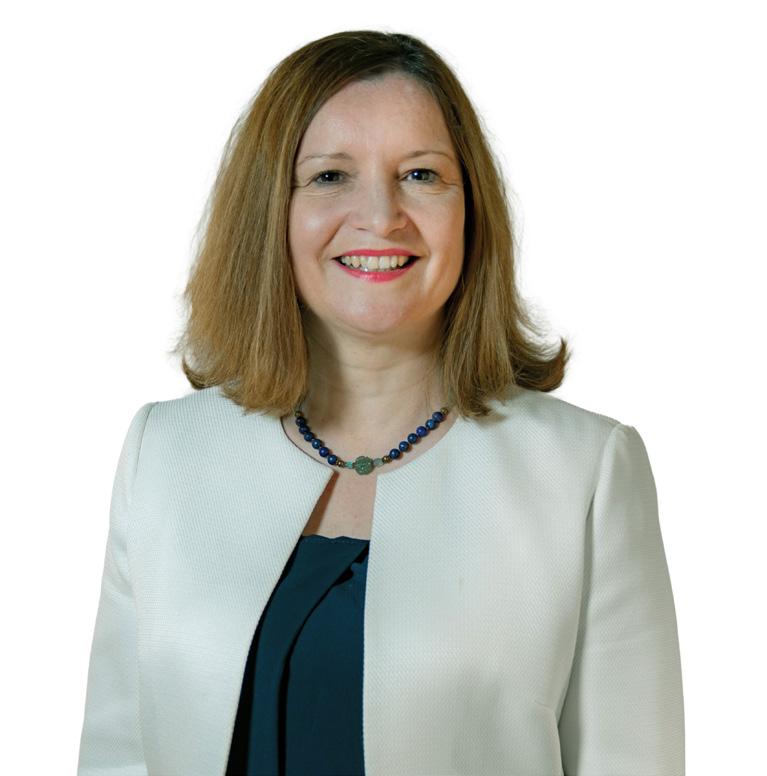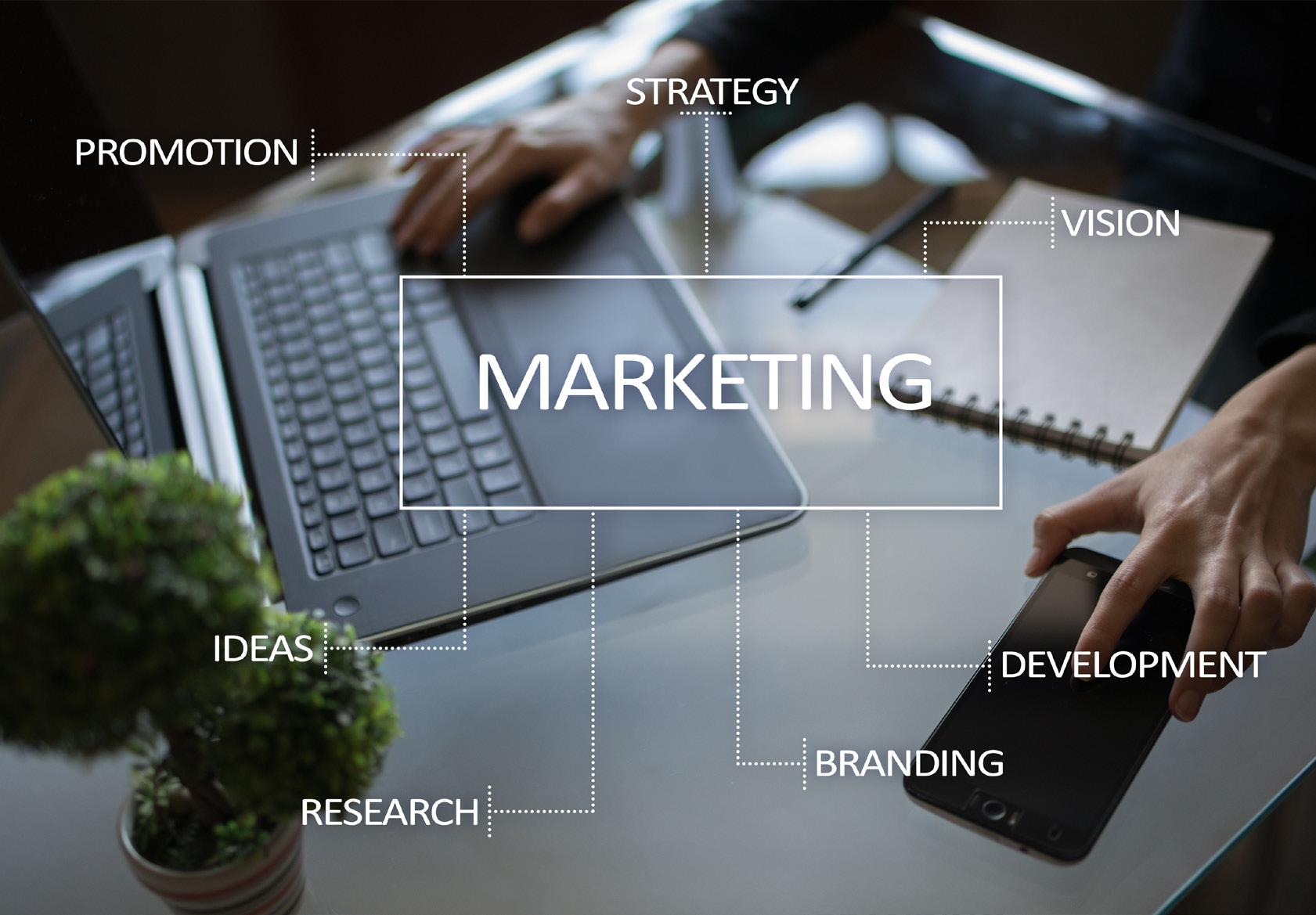
9 minute read
Extend Your Brand in the Middle East
By Zoë Buckingham, Founder and Managing Director
of
Zoë Buckingham Ltd
In this article, marketing expert and ABCC member, Zoë Buckingham offers her tips for succeeding in the GCC and Middle East.
It is my pleasure to share my knowledge of marketing in the Middle East. I hope that you will find this article useful when planning to expand your business across the region.
First, a word about my experience. I have had the privilege of working on some fascinating projects in the GCC, starting six years ago with work for government organisations, family offices and private companies. Focus on the Middle East, in particular the Gulf region, followed successful delivery of projects in Europe, North America, Asia and Australia, and this has been useful in understanding what makes the Middle East unique.
My company specialises in businessto-business marketing and our focus industries are technology, telecoms, fintech, healthcare and law. Essentially, our company is dedicated to marketing products and services that can be tricky to understand and communicate. We like to bring clarity and creativity to businesses, using attractive visuals, smooth technology and dynamic writing to engage with potential clients.

I hope that you find my suggestions useful and invite you to get in touch to discuss your own experiences.
Understanding your Market
Unsurprisingly, market research and market positioning will be a more detailed exercise than in your domestic market. Your product or services may need considerable adjustment to meet the requirements of local clients and whilst some of these changes will be customer led, some will be dictated by legislation.
Entering Middle East markets entails a combination of independent research and engaging with the right partners or local teams to give you a clear understanding of the way ahead. The ABCC will be able to give guidance, as will the Department for International Trade and the relevant UK embassy.
The company structure that you adopt at the outset will ultimately influence your commercial approach. If you work through in-country partners, you may need to use partner-led marketing strategies. Your representatives will require clear and highquality collateral which thoroughly explains your offering as you may not be present in every meeting and discussion. Visits to your partners and regular online meetings will be essential in bringing you together as a team and there is no doubt that time spent incountry will be the quickest way to get up to speed. Recruiting or transferring staff to local offices will ensure that you can work more closely with both partners and customers.
Part of your market research will involve understanding pricing models in your chosen territories and developing a strategy that works for your business. Your local advisors will play a critical role in helping you to establish a pricing model that will not only win business but ensure that your local operation is sustainable in the long term. Pricing should consider the time needed to establish credibility and trust. Sales cycles may be longer than in the UK and this should be reflected in sales forecasts. >>>
Preparing your Brand
Fine tuning your brand for Middle Eastern markets will be an exciting part of your new strategy but you may find that you need to take a step sideways before moving forward.
It will be essential to your success to find an agency who can work with the necessary languages and is sensitive to cultural nuances. Depending on your target countries, the right-to-left reading aspect of Arabic may mean that your existing website, social media feeds and even business cards may not adapt well. Likewise, some fonts have Arabic equivalents, and some do not. Multilingual designers will help to create an aligned strategy that will enhance your brand. For your digital properties, work with skilled technologists to ensure that your website and other platforms can support different languages and character sets.
Likewise, you should consult cultural experts on colours and imagery to ensure that they will be successful in your target countries. Pay close attention to dress codes when showing images of locals and always ensure that you have written permission for images of anyone that you feature.
You will find it easier to work on Middle Eastern marketing campaigns with local staff to support you but make sure that your brand values are fully understood and communicated to your supporting teams.
It’s the Way You Say It
Whilst in many major companies and at many business events, English is spoken, providing Arabic versions of your literature will be welcomed by your potential customers.
It’s easy to underestimate the significance of appointing the right translator for a project. On some projects, Zoë Buckingham Ltd worked with different translators to successfully bring together energetic ‘advertising’ style straplines with technical content. A great example of this was work that we produced for a telecommunications company. We had to recruit a translator with a Master’s in Electronic Engineering to translate the more technical content and a more creative translator to write the headings and to ensure a consistent tone of voice.
Translations don’t read well when terms that are critical to your business are translated differently in different pieces of marketing collateral. Before commissioning any translation, you should produce a list of key industry terms, company terms and job titles and ask the translator to work on these first. These translated words and phrases, which could also include items such as your company mission statement, should be placed in a glossary document where they can be referred to when working on the next project.
Your Website
Your website really should be the crown jewel of your brand presence. How it looks and works at present will dictate how much needs to be done to turn it into a compelling platform for marketing your business in the Middle East.

If you are going to include Arabic on your website, you should consider how the copy will be laid out. The language is read from right to left so the website needs to support this. Adding French to your site will increase the text length compared to English.
The Middle East is known for its glamour and there is an enthusiasm for beautifully designed digital platforms and strong communications. From a design perspective, a smart corporate website that includes some localised content will never offend. However, you will achieve more if your web properties reflect an understanding of the culture of your chosen country. There are ways of customising elements of your brand without alienating clients in other parts of the world. Careful research around both content and visuals, executed with creativity, will tell an interesting story that your audience will find engaging.
Earlier I mentioned ‘taking a step sideways before going forward’. This applies to content as well as technology. Consider the existing content on your site to ensure that it presents the right image to your Middle Eastern customers, in addition to creating new articles and webpages.
From an operational perspective, having a website with a good Content Management System will enable your local teams to act as authors of their own blogs and webpages, keeping content up to date and making it relevant for their audiences.
Social Media
Just as the divide between business and personal life tends to be more fluid in the Middle East, so too is the way that social media is used.
A report by FIPP cites that internet users in the MEA have an average of 8.4 social media accounts, with 10.5 per person in the UAE. 70% of Egypt’s internet users watch YouTube daily while WhatsApp and Facebook, channels employed less frequently in European business, are used extensively across the Arab world. Instagram is extremely popular for its visual appeal and LinkedIn is used by major public and private sector organisations, much as it is in the UK and across Europe.
On reflection, the Middle East is a social part of the world where people understand the importance of communication, so it’s not really surprising that social media, which is essentially a digital version of the coffee house, would have such influence.
A note of caution around social media as the laws around its use vary from country to country and can be stricter than in Europe. For example, in the United Arab Emirates, it is illegal to post an image of someone without their consent, to discuss confidential information concerning a third party or to engage in defamation or slander.
I mentioned visual appeal earlier. This is critical for all your marketing in the Middle East. Instagram is clearly built around visual appeal, but don’t underestimate the influence of well-presented posts and images on every platform.
Likewise, who doesn’t want to be spoken to in their mother tongue? It’s important to plan for the use of local languages in social media posts, especially for consumer brands. The choice of languages will need research and you should discuss tone of voice with your local marketing teams to ensure that your brand is well represented.
Conferences and Exhibitions
Live events are popular in the Middle East as they provide the opportunity for highly valued face-to-face meetings.
Whether you have members of your team speaking at a conference or you are exhibiting at an exhibition, you should aim for visual appeal.
If you are speaking at an event. try to include video and refer to your video during your presentation. Remember to thank the organisers and hosts of the conference.
Exhibition booths should be attractive and high tech and put forward your offering clearly, ideally through images. Find out what publications are issued during the event and which social media channels are used. Is there a dedicated mobile app for the event?
Hospitality is important at Middle Eastern events. You should consider comfortable seats on your booth and access to private meeting areas to continue discussions. Try to include a hospitality section in your booth with plenty of drinks and snacks and present small gifts to those who spend time with you.
Every country in the Middle East is different and you should spend time researching the local culture and making sure that your team is familiar with local customs and dress codes. Literature should be memorable and reflect the booth design so that it’s easy for visitors to connect you with your literature.
Following up after exhibitions and conferences is important and should be done in person wherever possible. It is best to extend your stay after an event to meet with people who showed an interest in doing business with your company.
Meetings
You have met some amazing people and now you have been invited to some meetings for a more in-depth conversation. Ideally, these will be face-to-face and involve your local representative to ensure a continued flow of communication both before and after your meeting.
When meeting with new business contacts, take advice from your local representatives and follow etiquette and customs.
It is best to arrange meetings just a few days before, demonstrating respect for your host’s other responsibilities. Meetings can be freer flowing than in the West, with more people involved and visitors arriving to discuss other matters. It’s best not to timebox meetings the way you might in the West and to respect the process of decision-making which can take longer. Likewise, it’s best to allow time either side of your meeting in case the appointment changes. It will also prove easier to arrange meetings at certain times of the year; Ramadan and other religious and national festivals should be avoided.
Do remember to bring gifts. Delicious food works well, particularly from the UK, such as tea, chocolates or sweets. You could also offer a useful gadget, of high quality and branded with your company’s logo.
Explain your company’s products and services clearly and in brief and bring samples of your products.

Ready to Launch?
I hope that the tips included in this article are useful. The key take-away is that detail really is important in developing a strong brand in the Middle East. Your brand should feel local and look amazing. It should engage with your target audience and project a strong message. As you start to engage with local clients, embracing the culture and showing respect will help you to thrive.
Building your presence in the Middle East will take time, but it will also help your brand to evolve into a more creative, people-centric, inviting proposition for all your clients, bringing benefits to your global business in the long term.
About the author www.zoebuckingham.com
Zoë Buckingham is an experienced marketing consultant with a strong track record of supporting international business expansion and helping to secure investment. Her specialist areas are finance, fintech, professional services, technology, law and healthcare. Zoë has outstanding people skills and is accustomed to navigating different cultures. She has worked with organisations across Europe, North America and the Middle East.
Zoë is well networked both in the UK and internationally. She is a Freeman of the City of London, on the Court of the Worshipful Company of World Traders, a regular presenter of webinars for the Financial Services Club and for a majlis in Bahrain. She is frequent participant in ABCC events.










